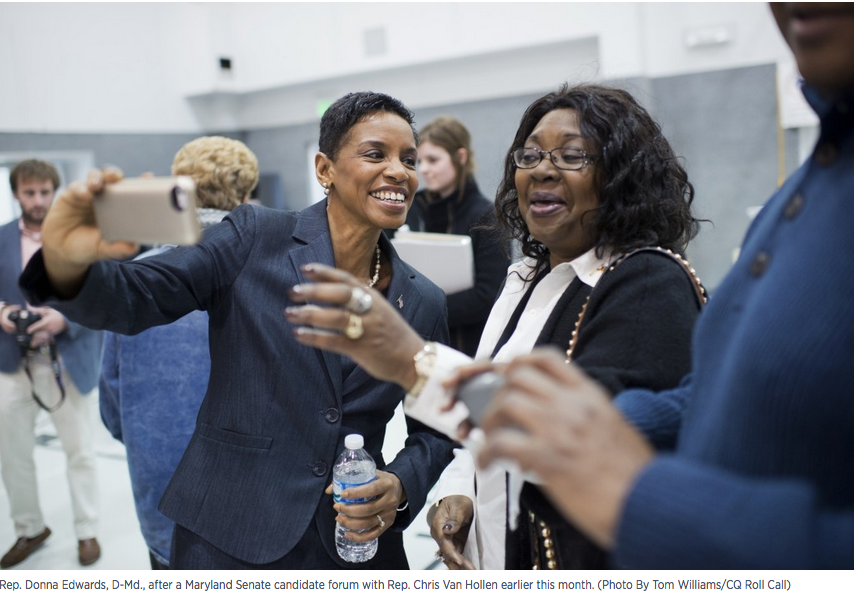MIA: The Black Men Who Ought to Have Shown Up for Donna Edwards
Before the fractious Maryland Democratic primary battle between Donna Edwards and Chris Van Hollen ended in defeat for Edwards on Tuesday night, it laid bare the depth of America’s problems with race and gender.
If Edwards had been a white male, the campaign would have been portrayed from the start as an interesting but lower-key race between two progressive members of Congress. But Edwards is a black woman, so identity politics were pushed front and center.
Van Hollen represents Montgomery County, just northwest of Washington, D.C. a reliably Democratic stronghold, home to many government workers. Edwards represents Prince George’s County east of D.C., an area that’s about two-thirds African-American with wealth about half that of Van Hollen’s constituency.
But where you’d expect support for Edwards — from black leadership — little showed up. The Congressional Black Caucus, which usually can be counted on to support fellow African-Americans, collectively turned its back on her, declining to endorse. Individually, only four of the 46 CBC members personally endorsed her. In all, Van Hollen claimed the support of some 100 Maryland black leaders. Even the president was seen as favoring him.

According to Edwards herself, the tensions with some members of the CBC went back to a heated internal conversation over the White House’s “My Brother’s Keeper” program supporting young African American men — an effort that prompted Edwards to ask where similar support was for young African American women. Tempers flared, she said, and she didn’t go back to the CBC for a while.
Good for her for being unafraid to ask questions like that, even if not everyone appreciates it. As Rep. Hank Johnson (D-Ga.), one of the few CBC members who did endorse Edwards, put it in an interview with Politico, “Donna is about taking care of the business of governing, and she is not particularly focused on backslapping and hobnobbing.”

In other words, Edwards, a lawyer and community activist, is busy doing the job she was elected to do. While her accomplishments might not be as trumpeted, they are substantial. Among them was her leadership, as the co-founder of the National Network to End Domestic Violence, to push for the Violence Against Women Act of 1994. As a congresswoman, she worked to include Maryland in the Afterschool Suppers Program, which provides nutritious evening dinners to kids who go home to an empty plate. She secured a provision in the Affordable Care Act to hold insurance companies accountable for unjustified rate increases.
Her independence and defiance of the go-along to get-along requirements of the good old boy and girl network often put her at odds with the powerful in her own party, including both Nancy Pelosi and another fellow Marylander, Steny Hoyer. She did, however, win the blessing of Raising Our Sisters’ Assets Political Action Committee (ROSA PAC), which supports women of color running for Congress. The pro-choice EMILY’s List endorsement called Edwards a “values-driven leader with a reputation for getting the job done.”
Could Edwards’ backers have rightly been accused of practicing their own form of racial and gender politics by citing the need for a black woman in the Senate?
Actually, no, because Edwards’ candidacy was not about identity but about the special understanding that black women have of single motherhood, the absence of responsible men, poverty and its companion, hopelessness. Principled progressive empathy is appreciated and necessary, but the presence of a champion whose own life is testimony to solving the real problems that women of color face is urgently required. It’s the voice, not the skin color that matters.
Maryland is a former slave state that gave birth to Harriet Tubman, a woman finally being recognized on our currency for her unique and special contributions to America. Yet women like Edwards still don’t get equal recognition for their achievements.
Black women have always supported black men’s contributions to the national discourse and policymaking. But the failure of black men — especially the men in the Congressional Black Caucus — to support an abundantly qualified black woman’s candidacy was a stunning betrayal.
Roll Call columnist Michelle D. Bernard is a lawyer, commentator and CEO of the Bernard Center for Women, Politics & Public Policy. Follow her on Twitter at @MichelleBernard.

